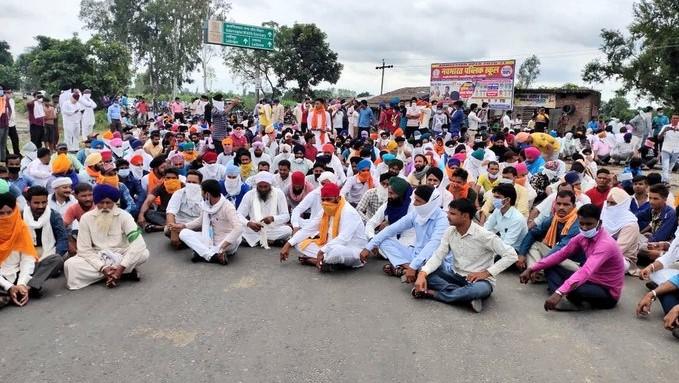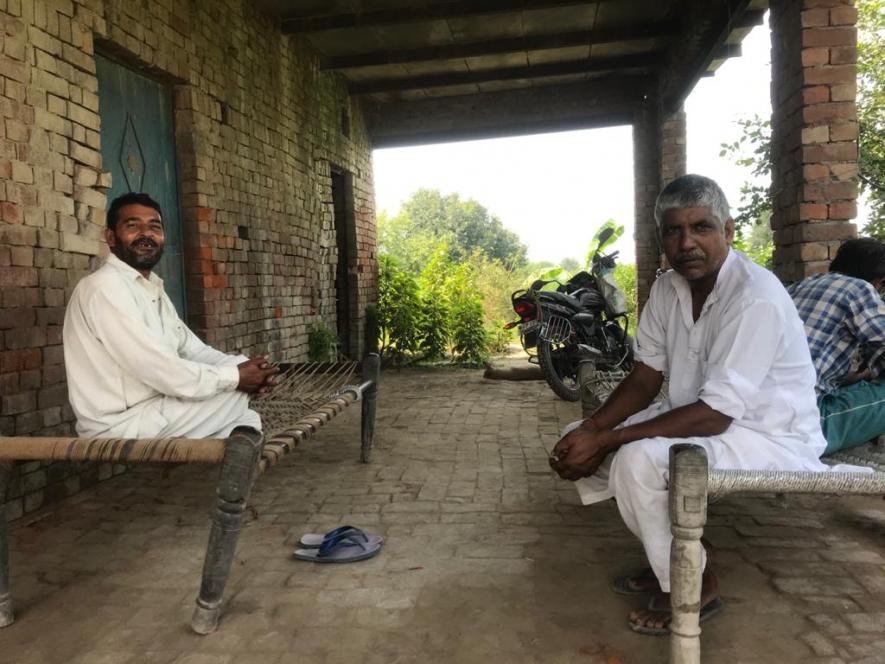Why Farmers Are Up in Arms Against New Farm Bills

Image Courtesy: Twitter
Confusion and anger sweeps the verdant farmlands dotting the border of western Uttar Pradesh with Haryana, where the paddy fields have flowered and vegetables are being sown. Assurances from the Centre that the existing system of marketing and pricing key agricultural produce—the mandis and Minimum Support Prices—will not be dismantled have not worked, and farmers of the region are feeling betrayed. Many are yet to recover from the body blow of the sudden lockdown imposed in March to control the Covid-19 pandemic. When they saw how the Modi government hustled its three farm bills past Parliament, it left them bewildered, especially the small farmers and share-croppers.
In the Lok Sabha elections of 2014 and 2019, and in recent Assembly elections, large numbers of farmers of this region reposed faith in Prime Minister Narendra Modi’s larger-than-life image and voted for his party, the BJP. Now they are wondering why his government, instead of making minimum support prices (MSPs) mandatory for all crops, is liberalising their fields altogether. Even bigger farmers, those who sow wheat and rice, are not keen on the government’s idea of an “alternative” to existing mandis and wholesale traders. They feel traders and corporate buyers of their produce, if not even bound by existing mandi regulations, howsoever weak, would get monopoly powers to dictate prices.
Share-croppers: a category of their own
Shehzad, a young share-cropper, grows seasonal vegetables—mustard, spinach, lady-finger, carrot, potato—on 5 bigha, for which the absentee landlord demands Rs.16,000 a year. They lost their crop during the lockdown, due to stringent restrictions on transportation. “The vegetables died in the fields and we almost starved,” says Shehzad, whose field in Baghpat, Uttar Pradesh, is 40 km from the nearest wholesale fruit and vegetable market at Azadpur in Delhi. “A sugarcane farmer may get paid late, but in no circumstance will he get below the rate pre-determined by the government. We want this system, call it MSP or floor price, for vegetable-growers like us too,” he says.
Instead, what the government is offering is a chance for landlords to negotiate the price of their crop with traders, independent of state intervention in determining costs or pricing. “Big companies will not come here,” says Shehzad. “If they did, it would perhaps save us the expense of transporting our produce to Azadpur.” But he knows that corporate buyers impose strict quality conditions. This is why he demands the government fix a floor price. That, in his view, could translate into a real choice for farmers between the wholesaler at the mandi, the retail stores, and any potential private traders who materialise. “But government will not do this, because it is anti-poor. That is why things are worse now than before, especially if you are poor,” says Shehzad’s relative, Raeesa, an old lady who works in the same field.

According to the new rules, any company, firm, registered society, farmer-producer organisation, or cooperative society is free to purchase crops or produce from farmers, outside the mandis. Essentially, the Centre has overridden state governments in the name of inter-state trading and said that wholesale markets are to remain under state government control while everything outside them falls under central—Modi’s—purview. There will be no entry or exit barrier to non-mandi trade in agri-goods, anybody can do it at their own pace, and there will be no government levy. This means no mandi tax will be charged on transactions outside the wholesale markets. One of the three new laws (yet to be signed by the President) does have a clause protecting share-croppers like Shehzad and his family. It says landowners cannot enter contracts to their detriment, but this is not what Shehzad and his family need. “We want government to fix MSPs for fruit and vegetables,” he says. The reason is that fruit and vegetables are perishable and small farmers spend heavily to transport them to mandis. Typically, vegetable-growers in Uttar Pradesh are small farmers. Their yield is not enough to justify selling at a wholesale rate.
Even Shehzad sets up a small “futkar” or retail store within a designated space for retailers at the Azadpur Mandi, selling to retail customers only. For this, he pays a hefty 10% commission at the mandi, he says. “So, if we are assured a price below which vegetables will not be sold, our problems are solved,” he says. But the new law on contract farming does not reassure any farmer of MSP—not even cereal or grain farmers. It is only in full-page advertisements and verbal statements that the Centre is promising that the mandi-MSP system will continue. The situation is not inspiring farmer’s trust.
Why farmers in Haryana are angry
As you cross the Yamuna, which marks the border between Uttar Pradesh and Haryana, the size of land holdings goes up, while the sugarcane plantations fade into rice fields. In Haryana, too, farmers are unconvinced that the new system is going to help them. Modi and his Cabinet ministers have been saying farmer’s income will climb after “removing middlemen” from the agri supply chain. This rhetoric may appeal to middle-class city-based consumers, however, it does not have the same effect on farmers. For, though they dislike the monopolistic control of traders over prices at mandis, they know that removing one middleman to replace him with another is no solution.
Take farmer Samundar, who has been discussing the three bills for several days at a small brick shelter at the intersection of some vegetable and rice fields in Sonipat, Haryana. He and his close friend Jagbir do not agree on the possible impact of every proposal in Modi’s new laws, but, on the whole, they do not like any of the proposals. “If the adati (wholesale trader) is finished off, the zamindar will also be finished,” says Samundar. “So we are not happy with the new system of the Centre,” he says. Jagbir, who is a little on the fence, says, “I don’t like the new system either but we will know what it is like once it comes into force. The existing mandis and MSP should remain, and that is why government has hiked MSP.”
“Only big farmers and traders will benefit,” says Samundar, who owns roughly four killas—20 bigha—on which he has sown vegetables, rice and wheat. The wheat is consumed by his family, the rice he sells at a wholesale market (MSP fixed by government), while a trader from nearby Narela (in Delhi) sends a truck pick up his vegetables. The irony is that last year’s MSP for wheat and rice were not enough to cover Samundar’s costs. Then he lost his standing crop of vegetables worth Rs.5-7 lakh (cauliflower, brinjal, and so on) due to the lockdown. “But it is the trader [from Narela] who loaned me what I had lost so I could sow again this season,” Samundar says.
Typically, when Samundar sells to the vegetable trader, with whom he has a long-standing relationship, he loses 5% to “cutting”—the local term for a deduction on account of expected shortfalls in the produce, as assessed by the trader on the spot. Cutting is standard practice across the country where private traders negotiate with farmers directly. “The advantage is he pays in cash, on the spot, and there is no tension for us,” Samundar explains. However, just because he deals with a private trader does not mean he wants the end of MSP or mandis. For one, farmers will not end their existing relationships with traders, in or outside mandis, in the delusional hope of starting a bidding war for their produce. Two, if the mandi is undermined, farmers will have no way to ascertain prices of their crop. Three, the mandi traders are a stable source of income in a volatile world.
Fog of confusion
Farmers know enough to trust only their experience and instinct, for this is not the first time they are being promised the moon. “This law is absolutely wrong—we are assured an income when we sell at mandis, even though it is not much,” says Rajendra, a farmer from Palri Kalan village in the Rai tehsil of Sonipat. “Governments change and laws are tweaked, but the farmer’s suffering only grows, because farmers have no right to fix prices, only government or traders do,” he says.
The Centre’s advertisement overdrive is partly connected to changing the perception that farmers are being bamboozled. The Prime Minister, aware of his personal equity with a section of people, is trying to use it to say that the amended laws are good for farmers. However, farmers are scheduling protests in response, suspecting that the goodwill Modi has created is being deployed to get the corporate sector into farming.
“Is one person better to determine the right price for an item or are ten people better,” asks Sateesh Malik, a farmer from Lehrara village in Sonipat tehsil. In other words, mandis give farmers many options to check rates of their produce, whereas directly negotiating with traders, without government involvement, outside mandis, snatches them of any collective strength as farmers. “Even if the traders come buy from us, mandis must remain,” says Malik.
Not just Haryana
Sensing the nationwide unrest—which spilled into street protests and an all-India shutdown on Friday, 25 September—the Centre announced an early hike in the MSPs for the coming marketing season. Even this has had many farmers toss between hope and despair: on the one hand, many of them want to believe that a Modi-led government has their best interest at heart. On the other, they are wondering why privately-negotiated contract farming is being pushed as a panacea, when even the government often fails to fix a price for their crops that covers their expenses.
“In 2014 I believed in Modi, too, but now I know he is simply bringing corporates into our fields, after first undermining the MSP system and mandis,” says Dilip Patidar, a farmer in Buda village of Mandsaur district in Madhya Pradesh, a spice-growing belt. “Farmers oppose the new law because the mandis may not be in excellent shape, but they are at least something. We want a law that guarantees MSP, not ‘direct agreements’ with traders and we want more mandis,” says Patidar. “If there are no mandi auctions, then we will never know what prices to sell at,” he says. Madhya Pradesh farmers, like those in Punjab, are organising road blocks, a national protest movement, and a shutdown of mandis on Friday in solidarity with all other protests.
Farmers are being told the Centre will not tax non-APMC traders, but what is really happening is that state governments are being left with the old physical infrastructure of wholesale markets, in a year in which they have almost no revenue due to the Covid-19 lockdown (which was styled and imposed by the Centre). If states are also deprived of revenue from mandis, they will be weakened too. The additional layer of worry comes from the fear factor. “The farmers protests we see are the tip of an iceberg. Remember that small farmers would like to protest too, but they fear that if there is stone-pelting or another such event, there may be a crackdown. Farmers of Madhya Pradesh have already faced such a situation,” Patidar reminds.
But once these bills become law, it will no longer matter what farmers think, and that is why they are protesting.
Get the latest reports & analysis with people's perspective on Protests, movements & deep analytical videos, discussions of the current affairs in your Telegram app. Subscribe to NewsClick's Telegram channel & get Real-Time updates on stories, as they get published on our website.
























